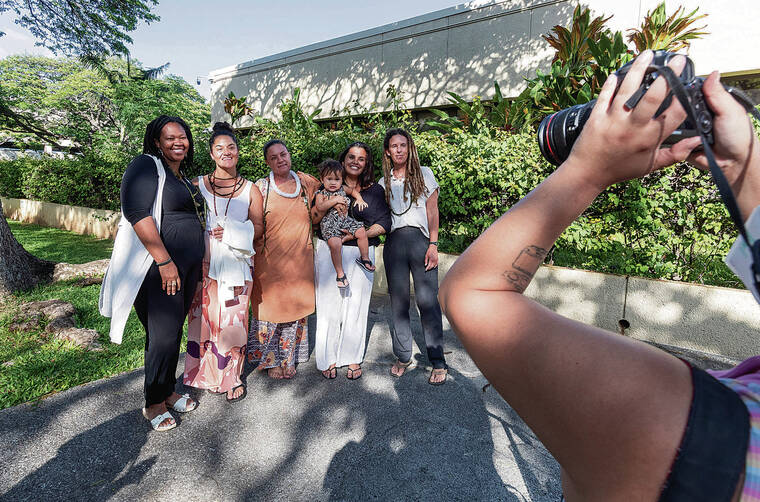
Kiana Rowley, a registered nurse, testified Monday in Circuit Court that she is paying $100,000 in tuition to become a certified nurse midwife after a Hawaii law requiring midwives to have a state-issued license went into full effect July 1.
Although Rowley’s tuition is to become a certified nurse midwife, it still takes several thousand dollars to become a certified professional midwife at one of eight approved schools on the mainland, according to an attorney for plaintiffs.
Rowley is one of nine named plaintiffs who filed a civil complaint, asking for the court to stop the state of Hawaii from enforcing the “Midwifery Restriction Law,” which they say criminalizes practitioners, including skilled midwives who do not have the licensing the state now requires to practice midwifery, as well as birth workers and family members who care and support those who are pregnant and giving birth.
Circuit Judge Shirley Kawamura began hearing testimony Monday from the midwives and student midwives at a four-day hearing for a preliminary injunction asking the court for an emergency measure to block criminal and civil penalties.
Hawaii Revised Statutes Sec. 457J, which became law in 2019, requires that anyone providing advice or information or care during pregnancy, birth and after birth have a state license, or they could face imprisonment, fines and legal penalties.
The law made allowances for those who already were practicing midwifery until July 1, 2023.
Hillary Schneller, attorney for the Center for Reproductive Rights, told the plaintiffs and supporters outside the courthouse that the work began a year ago on the complaint filed Feb. 27, but “it was important to tell your story in court. That is the real evidence.”
The Center for Reproductive Rights, a global reproductive rights organization, teamed up with the Native Hawaiian Legal Corp. and Perkins Coie LLC, a Los Angeles-based law firm, to sue the state, Attorney General Anne Lopez, the Department of Commerce and Consumer Affairs and its director, Nadine Ando.
Schneller said the lawsuit’s claims include reproductive autonomy and the affirmative duty of the state to protect Native Hawaiian rights.
The plaintiffs contend that the law essentially erases the apprenticeship model used and sought by pregnant Native Hawaiians and midwives.
Schneller told the Honolulu Star-Advertiser that “the practices are being regulated out of existence.”
Many of those who testified said the schools for licensure do not align with their Native Hawaiian cultural practices, and said it would be a hardship to attend training on the mainland.
If a student does not finish the requirements, including apprenticeships, in time, they have to pay more to stay in the program, Schneller said.
Rowley, who worked five years as a labor and delivery nurse, said, “I always knew that I wanted to be a midwife” after witnessing her younger siblings being born at home.
After working with a family with a language barrier whose baby died at the hospital, she decided to find a different way.
Rowley, who grew up in Kula, Maui, was living on Oahu when she moved with her husband and two children to Maui to train with other midwives, and was considered a trusted midwife before the law changed.
Four years ago she enrolled at Georgetown University in Washington, D.C. While some of the course was online, she needs to travel to Washington three times. She also needs to do her clinicals — shadowing a practitioner for four months at different clinical sites. She is on her second rotation on Kauai, living part of the week there. But she has not been able to find anything else in Hawaii and needs to find two other sites to fulfill her requirements.
Rowley must rely on her parents and mother-in-law to help with the care of her children.
Schneller told the Star-
Advertiser that home birth is for low-risk babies.
Maui native Morea Mendoza, during cross-examination by the state, said she was receiving care from an obstetrician/gynecologist while seeking the help of an unlicensed midwife, Ki‘inaniokalani Kaho‘ohanohano, who is also a plaintiff in this case.
When the midwife noticed her blood pressure was irregular, she instructed Mendoza to buy a blood pressure cuff and check it.
Mendoza discovered one day that her blood pressure was high, and the midwife instructed her to go to the hospital, where it was discovered the baby was in an unusual position, and Mendoza delivered by Cesarean section.
The midwife stayed with her at the hospital, held her hand and chanted and made sure Mendoza was comfortable, and helped clarify what the doctors were saying to Mendoza and what Mendoza was saying to them.
“Licensure didn’t mean anything in tangible terms,” Mendoza said, and she had initially sought a licensed person but chose a community-
recommended person instead.
“She (the midwife) made me feel that we were in alignment with what I wanted,” Mendoza told the court.
Ezinne Dawson, who has a Nigerian background, said she had a midwife with a similar background. She said she has given birth six times, and the last was a surrogate.
Just before Dawson’s youngest sibling was born in New York, her mother was told by hospital personnel to go home. But they lived an hour away, and her mother felt she was going to give birth soon to her seventh child.
They left but returned shortly to the hospital, where she gave birth.
Dawson said she became a midwife “after witnessing the struggles, especially of minority women trying to deliver a baby in a hospital setting.”
She makes herself available as a mentor, especially to people of color. “There’s not a lot of Hawaiian practitioners. We need more.”
The hearing continues Wednesday when plaintiffs’ expert witnesses will testify. One will speak to the reason why having midwives in attendance helps a person feel safest, Schneller said.
Read More: World News | Entertainment News | Celeb News
Star Ads





